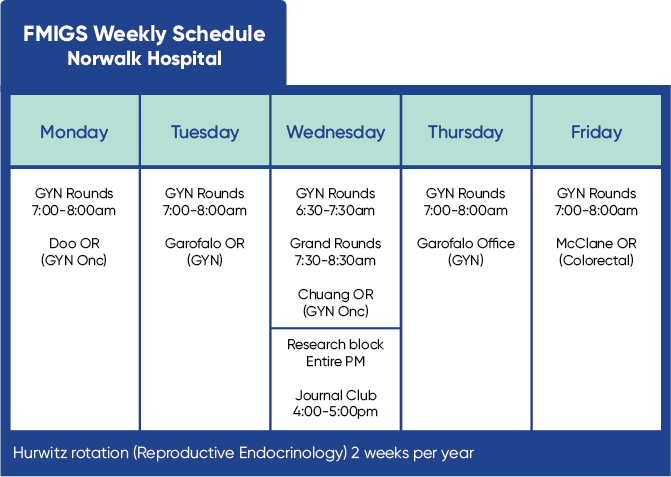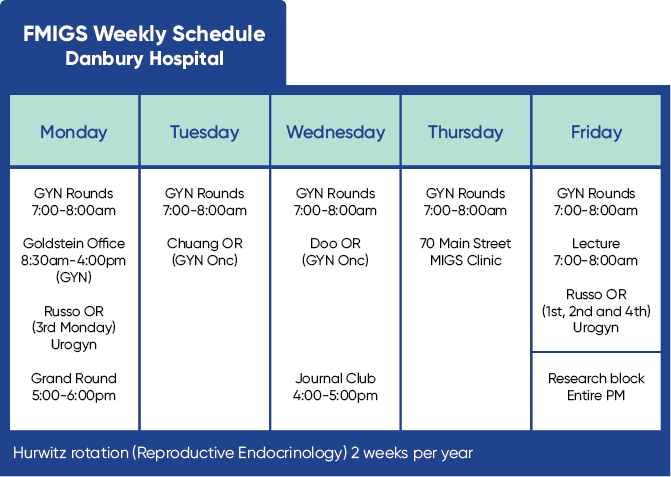Danbury Hospital Minimally Invasive Gynecologic Surgery Fellowship Program (AAGL)
Program Structure
The overall goal of the Fellowship is for the graduate to serve as an independent specialist and consultant in the surgical management and techniques of advanced benign minimally invasive gynecologic surpassing competence expected at the end of a categorical residency. Graduates will provide top quality patient care and education, and be leaders and innovators in gynecologic minimally invasive surgery and in the treatment of advanced gynecologic disorders such as uterine fibroid, pelvic pain, endometriosis, pelvic organ prolapse, urinary incontinence, and menopausal care. They will have a broad understanding of advanced gynecologic disorders, especially ones that often end in a surgical intervention. In addition, they will have gained extensive surgical and clinical expertise that focuses not only on laparoscopic surgery; but also on advanced abdominal and vaginal surgery. They will have gained an excellent understanding of research methodology and evidence based practice principles.
The progress of the MIS fellowship is monitored during the entire 2-year period, and the graduating fellow is expected to become fully proficient in the following areas: management of complex benign and preinvasive gynecologic disease requiring surgical intervention; advanced knowledge of surgical techniques and equipment, pelvic anatomy and statistics. The fellowship will also focus on gaining expertise in robotic and traditional laparoscopic and hysteroscopic techniques. In addition, each fellow is expected to perform research which results in a thesis acceptable for board certification.
The training consists of a minimum of two years of continuous education following completion of an obstetrics and gynecology residency and includes formal rotations on MIGS services. A portion of the program will be devoted to clinical and/or laboratory research and fellows must conduct at least one research project under the guidance of a faculty who can mentor them in clinical research relevant to minimally invasive gynecology. The faculty consists of board certified and fellowship trained specialists in the following areas: Gynecologic Oncology, Reproductive Endocrinology, Urogynecology, Colorectal Surgery and Minimally Invasive Surgery.
During each rotation, fellows will have approximately two days each week dedicated to operative experience. They will obtain sufficient breadth and depth of gynecologic cases to encompass a wide array of pathology, operative techniques and clinical competencies. Fellows will also obtain experience in teaching residents and students appropriate surgical skills based on the level and experience of the fellow.
ROBOTICS:
A substantial portion of laparoscopic hysterectomies, myomectomies, and lysis of adhesions/endometriosis surgeries are performed robotically. Fellows will be able to participate in nearly all cases.
Our surgeons are skilled and experienced in using advanced technology to perform minimally invasive procedures. For robotic surgery, we use the latest, most advanced robotic technology available, the da Vinci surgical system. We are committed to innovation, equipping our surgeons with sophisticated technology so they can offer innovative surgical procedures here in our community.
Academic Didactic Schedule
Rotations:
Minimally Invasive (laparoscopic and robotic) Gynecologic Surgery
Fellows will learn to serve as an independent specialist and consultants in the surgical management of advanced minimally invasive gynecology in the areas:
- Robotic assisted laparoscopic surgery for benign and malignant gynecologic diseases including but not limited to uterine leiomyoma, ovarian masses, gynecologic malignancies including cervical, uterine, and ovarian malignancies
- Laparoscopic surgery for benign and malignant gynecologic diseases
- Single site laparoscopic and robotic hysterectomy
- Vaginal hysterectomy
- Open hysterectomy
- Operative and diagnostic hysteroscopic surgeries
- Participate in the management of intestinal and urinary tract pertain to the gynecologic conditions
- Participate in research in the area of minimally invasive surgery cost effectiveness studies
Reproductive Endocrinology
Fellows will learn to serve as an independent specialist and consultants in the surgical management of advanced minimally invasive gynecology in the areas of:
- Reproductive care with particular attention to diagnostic laparoscopy, operative laparoscopy, hysteroscopy, microsurgical training for the management of oviductal pathology, operative hysteroscopy for congenital abnormalities, dysfunctional uterine bleeding, and common gynecological pathologies resulting in dysfunctional uterine bleeding
- Management of complex clinical problems relating to infertility and reproductive endocrinology
Urogynecology
Pelvic floor reconstructive procedures are performed under a wide variety of circumstances and for a wide variety of conditions. Robotic-assisted sacrocolpopexy procedures occur several times monthly and will sometimes be available for MIGS fellow participation. Vaginal hysterectomies are performed several times monthly both by general and subspecialty divisions, and reveal a wide array of complexity and pathology. Finally, cystoscopy procedures are abundant amongst all providers and division and will provide the fellow with the opportunity to perfect this procedure under a wide array of conditions.
Colorectal Surgery
Fellows will learn to serve as an independent minimally invasive surgeon (laparoscopy) and other minimally invasive procedures for the treatment of colorectal diseases in the areas of:
- Laparoscopic techniques applicable to colon and rectal surgery
- Indications and contraindications to the laparoscopic approach
- Gross and microscopic features of the colon and rectal pathologies and histologies
- Anal and rectal disease, including hemorrhoids, polyps and fissures
- Colon and rectal cancer
- Diverticulitis and diverticular disease
- Inflammatory bowel disease, including Crohn’s disease and ulcerative colitis
Minimally Invasive General Surgery
Fellows will learn to serve as an independent specialist and consultants in the areas of:
- Minimally invasive surgical management of advanced gastrointestinal diseases
- Hepatopancreatobiliary, colorectal, hernia and solid organ diseases
Schedule:
The fellow will spend 50% of the time at Danbury Hospital and 50% of the time at Norwalk Hospital.


Educational Opportunities:
DIDACTICS
Fellows participate with core faculty members in GYN Preop Conference, M&M Conference, Tumor Board, MIS Didactics, Journal Clubs and Grand Rounds.
The fellow will also have access to the simulation centers located on both campuses where robot simulators are available for training.
TEACHING ROLE
The fellow is actively involved in the training of medical students, and residents who rotate through the Division. The fellow is required periodically to give formal presentations to the residents on topics in minimally invasive gynecology. Additionally, the fellow will actively participate weekly, with core faculty members, in morning rounds, M&M (monthly), journal clubs, grand rounds. Development of the fellow’s teaching abilities is considered to be an important part of improving his or her ability to transmit knowledge to others as a consultant, teacher, and investigator.
Research Opportunities
The Department of OBGYN has an abundance of resources and is well-versed in conducting clinical studies. The Department is also supported by resources in the form of mentorship by a number of faculty members, intellectual guidance by the fellowship director and associate fellowship director who are well-published in clinical studies and resources for translational research available at the Rudy L. Ruggles Biomedical Research Institute (RRBRI) at WCHN. Founded in 2009, RRBRI is a 17,000 -square-facility houses state-of -the-art equipment for basic and translational research and complements ongoing clinical research, including clinical trials and epidemiologic studies, being conducted at our three partner hospitals at Danbury, Norwalk and New Milford. RRBRI encourages an environment of collaborative research where scientists with expertise in a myriad of fields, share resources and knowledge across institutional and disciplinary lines.
Resident / Fellow Resources
Danbury Hospital has a comprehensive, quality simulation center geared toward surgical training of fellows. The Center includes computerized laparoscopic simulators and a high-fidelity robotic stimulator. These tools are open to our fellows 24-hours a day, seven days a week. Additionally, the Center includes equipment for a clinical case simulation. The Horblit Health Sciences Library & Multimedia Services Department is staffed by three Masters level librarians and a multimedia coordinator. In addition to a robust clinical program, the MIGS fellows will devote six months to research and have many opportunities to present at local and national meetings as well as publish original research.
How to Apply
All applications are submitted through AAGL via their website: Apply to the Program – AAGL » AAGL
Requirements
- CV
- Three current letters of recommendation
- A personal statement
- USMLE Step 3 Score
- ECFMG certificate (if applicable)
- Official copy of USMLE step 3 score (required)
- Photo
- Your residency ACGME case list
In addition, prospective candidates are expected to register with the National Residency Matching Program (NRMP).
Interviews are by invitation only. Selected candidates will be notified in writing through email and ask to schedule an interview.
The program does not discriminate with regard to sex, race, age, religion, color, disability or national origin.
Important Dates
Our program recruits one fellow every 2 years and will be again recruiting for Academic Year 2024-25. Please review important dates on AAGL’s website: Apply to the Program – AAGL » AAGL
